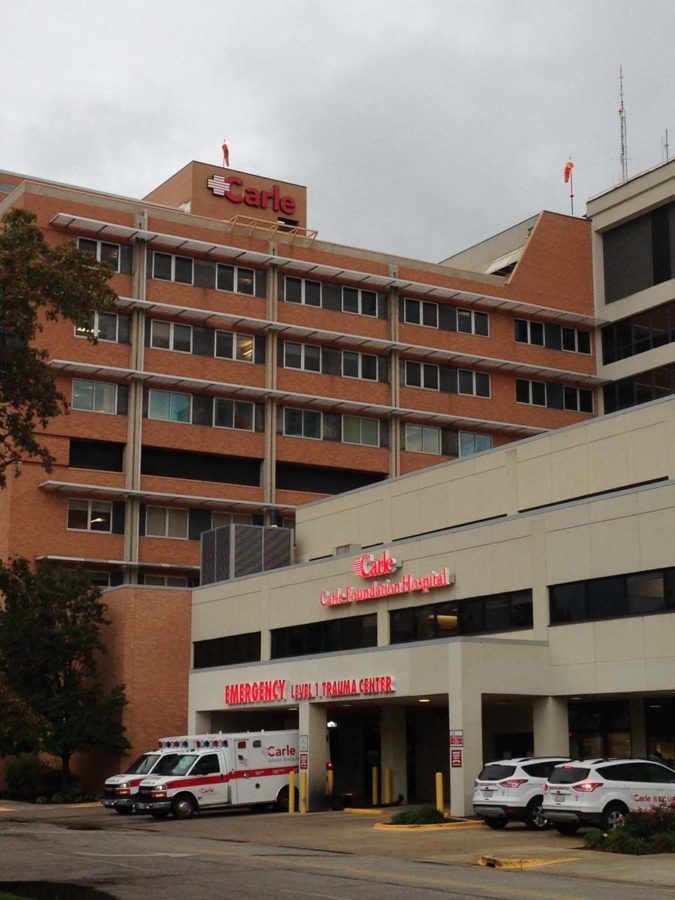Lawsuit history between Carle and Urbana provides insight moving forward
October 15, 2014
Unrest among Urbana residents regarding a rise in their property taxes lead to the posting of yard signs opposing Carle Foundation Hospital’s tax-exempt status.
The recent controversy has prompted Urbana residents to question whether Carle’s tax exemption should be legal, although Urbana governing bodies have been aware of the exemption since 2002.
While no lawsuit has currently been undertaken, Urbana officials are skeptical of the constitutionality of SB2194 in the Illinois Constitution, and Mayor Laurel Prussing hopes to form a countersuit against Carle in the future.
According to Article IX Section 6 of the Illinois Constitution, a property that is used for charitable purposes fits the bill to be exempt from taxes.
“The General Assembly by law may exempt from taxation only the property of the State, units of local government and school districts and property used exclusively for agricultural and horticultural societies, and for school, religious, cemetery and charitable purposes,” according to the Illinois Constitution.
Get The Daily Illini in your inbox!
After the Carle Clinic and the Carle Foundation Hospital opted for a merger in 2009, they were granted tax-exempt status under SB2194 in 2012, which permitted not-for-profit hospitals to deduct charity work. Of the $5.3 million paid by Carle to Champaign County in 2009 property taxes, Carle was able to successfully appeal $2.9 million.
Urbana was hit the hardest by Carle’s tax exemption, Prussing said.
“This affected Urbana far more than any other group of taxpayers because 87 percent of Carle’s property is in Urbana,” said Prussing. “The real damage is not on the city budget this year, but on all the taxpayers, business and residential, and on the city’s future if our tax rate is 25 percent higher than that in neighboring Champaign.”
Prussing believes that the hospital should be capable of contributing more to the city to save its residents money.
“Carle could much more easily pay its $10 million out of its $116 million profits than the city can afford a $1 million cut in its operating budget,” Prussing said.
Mike Billimack, Vice president of marketing, strategic planning and government relations for Carle, acknowledged that taxes did rise as a result of Carle’s filing for tax exemption, but there were additional factors.
“(Urbana residents’ taxes) spiked for a number of reasons; if you look at communities around central Illinois, pretty much everyone’s property taxes went up between 5 and 10 percent,” Billimack said. “That’s more of a reflection of the overall economy and the state of things and the state of Illinois.”
Billimack referred to the 2013 approval of Carle’s tax exemption, and explained the legality of the removal of the hospital as a taxable property.
“We filed for the exemption once the law was signed by the governor. We could have filed two years earlier because those properties were part of the not-for-profit organization at that point, but we chose to pay property taxes for two additional years while we knew this was going on in legislature,” Billimack said.
Billimack justified the tax exemption on the basis of a prior agreement in 2002 between the local taxing bodies and Carle, which lead to two primary lawsuits. The Urbana-based taxing bodies signed an agreement that stated Carle would give money up front in the case that the Carle merger happened. The agreement stated the local taxing bodies would not challenge Carle’s tax-exempt status, but the local bodies tried to challenge the status two years later.
“Part of the reason we filed that lawsuit was to protect the health care resources of the community and try to get an answer to this issue,” Billimack said.
Champaign Mayor Don Gerard acknowledged the fallout between Carle and Urbana was unfortunate, but said there isn’t much to be done about compensating Urbana for the tax hit.
“It’s just the price of doing business; it was a decision that was made at the state level,” Gerard said. “We, in Champaign, have made adjustments in other ways. We’ve made cuts, we’ve created revenue, we’ve done things — and unlike Urbana – we have other opportunities for revenue … it’s kind of not our fight. It’s the responsibility of state legislators.”
Moving forward, the University has partnered with Carle Foundation Hospital and is proposing a College of Medicine, which Alderman Charlie Smyth, Ward 1, believes will bring more financial struggle for locals. Smyth explains that between Carle’s tax exemption and the University’s own expansion, residents will gradually be hit with higher taxes.
“At the end of the day, it’s about preserving our ability to meet the needs of the community by providing that free and discounted care for those who need it, and in exchange for that, to follow the law and follow the rules that were created by our state and to move forward in that manner,” Billimack said.
Charlotte can be reached at [email protected].







